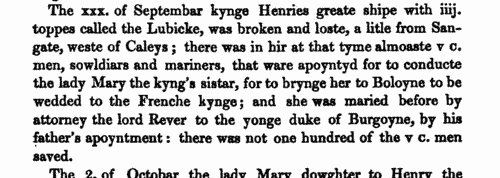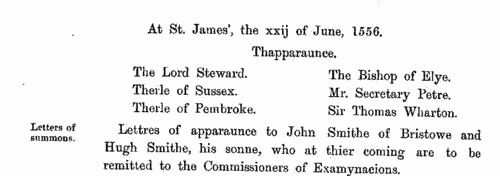Our indexes include entries for the spelling blunt. In the period you have requested, we have the following 776 records (displaying 41 to 50):
Inhabitants of London
(1375-1399)
Letter Book H of the City of London contains enrolments of recognizances between inhabitants, particularly citizens, for sums of money lent or due; grants of pieces of land or property; and various records relating to the city administration.
| Sample scan, click to enlarge

|
Close Rolls
(1429-1435)
The close rolls of the 8th to 13th years of the reign of king Henry VI record the main artery of government administration in England, the orders sent out day by day to individual officers, especially sheriffs of shires: they are an exceptionally rich source for so early a period. There is also some material relating to Wales, Scotland, Ireland and the English possessions in France. Also included is the Exchange Roll of 1424 to 1434, of licences to transmit sums of money out of the realm. | Sample scan, click to enlarge

|
London and Middlesex Feet of Fines
(1198-1485)
Pedes Finium - law suits, or pretended suits, putting on record the ownership of land in London and Middlesex. | Sample scan, click to enlarge

|
Clerks and Clergy in Herefordshire, Shropshire and Gloucestershire
(1504-1516)
The register of bishop Richard Mayew of Hereford, containing general diocesan business, but also including ordination lists for monks and clergy. Only a small proportion of the clerks went on to acquire benefices and remained celibate. Hereford diocese covered almost all Herefordshire, southern rural Shropshire, a westward arm of Worcestershire, and a northwestern slice of Gloucestershire. | Sample scan, click to enlarge

|
Inhabitants of Calais, and visitors
(1485-1543)
Richard Turpyn, a burgess of Calais, the English enclave on the French coast, compiled (or possessed) a chronicle of events there from 1485 to 1540, a copy of which survived among the Stowe manuscripts in the Harleian collection in the British Museum. This was edited for the Camden Society, together with a number of other papers relating to events in Calais in that period, by John Gough Nichols, and printed in 1846. Many of the persons named in the resulting book are knights and noblemen attending king Henry VII and king Henry VIII when on the Continent on diplomatic or marital business; but there is also a muster roll of the garrison of Calais of 1533 (136-139). | Sample scan, click to enlarge

|
Liegemen and Traitors, Pirates and Spies
(1547-1550)
The Privy Council of Edward VI was responsible for internal security in England and Wales, and dealt with all manner of special and urgent matters
| Sample scan, click to enlarge

|
Liegemen and Traitors, Pirates and Spies
(1550-1552)
The Privy Council of Edward VI was responsible for internal security in England and Wales, and dealt with all manner of special and urgent matters
| Sample scan, click to enlarge

|
Liegemen and Traitors, Pirates and Spies
(1552-1554)
The Privy Council of Edward VI and queen Mary was responsible for internal security in England and Wales, and dealt with all manner of special and urgent matters
| Sample scan, click to enlarge

|
Liegemen and Traitors, Pirates and Spies
(1554-1556)
The Privy Council of queen Mary was responsible for internal security in England and Wales, and dealt with all manner of special and urgent matters.
| Sample scan, click to enlarge

|
Tradesmen of York
(1272-1558)
No man or woman could trade in the city of York without having obtained 'freedom' of the city.Their names were recorded on the 'Freemen's Roll', or Register of the Freemen of the City of York, which contains about 19,900 names for this period. A list of names was prepared for each year, the year being here reckoned as starting at Michaelmas (29 September) until 1373, and thence at Candlemas (2 February). Each annual list starts with the name of the mayor and the camerarii or chamberlains. The chamberlains were freemen charged with the duty of receiving the fees of the new freemen; of seeing that only freemen traded in the city; and of preparing this roll, which was compiled from the names on their own account books from the receipts for the fees. There are three groups of freemen: those who obtained freedom after serving out an apprenticeship to a freeman; the children of freemen; and those who claimed freedom by 'redemption', i. e. by purchase or gift from the Mayor and Court of Aldermen.
| Sample scan, click to enlarge

|
Research your ancestry, family history, genealogy and one-name study by direct access to original records and archives indexed by surname.











